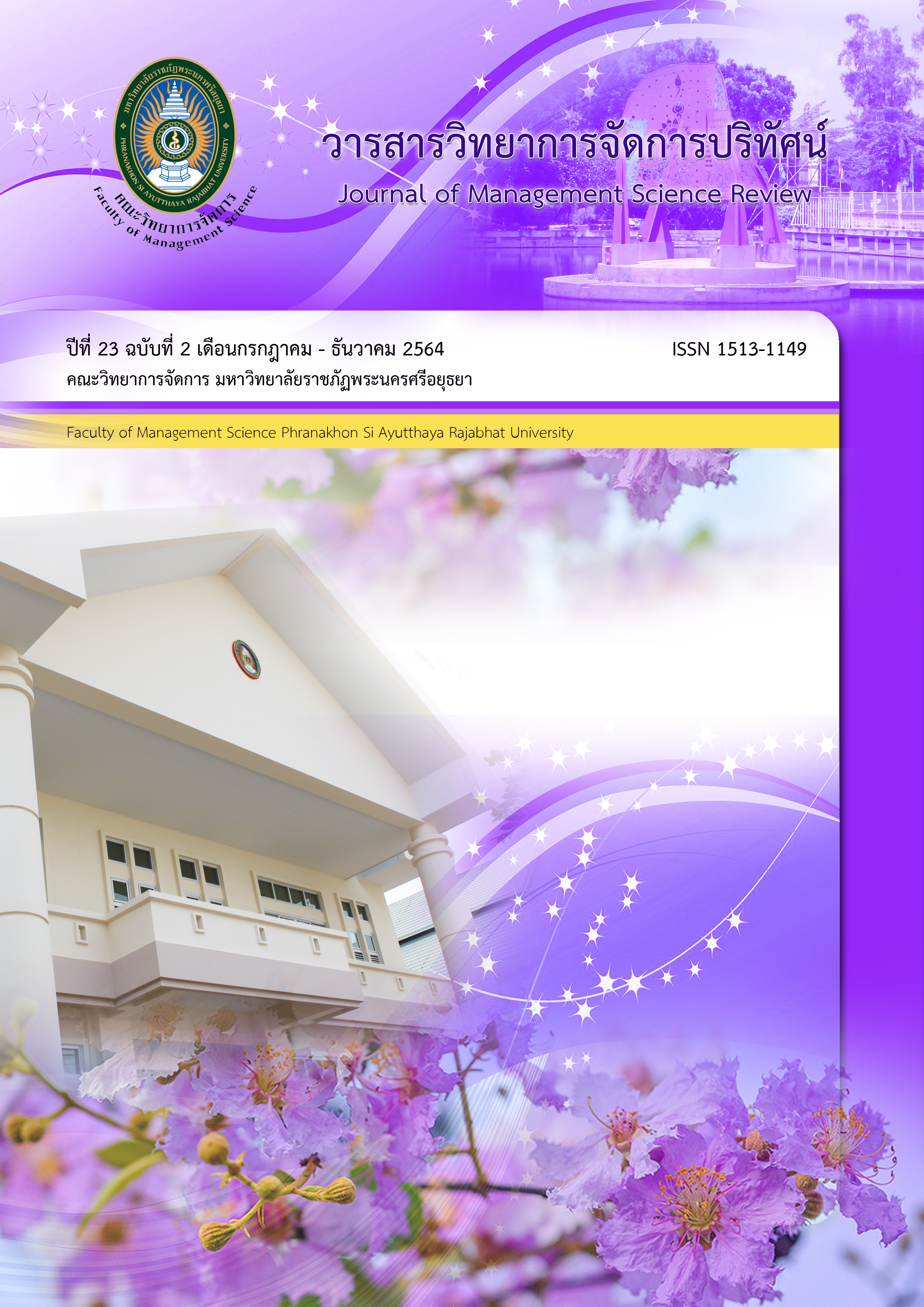ระบบบริหารทรัพยากรองค์กร: เครื่องมือสู่ความสำเร็จอุตสาหกรรมการผลิตในประเทศไทย
คำสำคัญ:
ระบบบริหารทรัพยากรองค์กร, เครื่องมือสู่ความสําเร็จ, อุตสาหกรรมการผลิตบทคัดย่อ
หนึ่งในความท้าทายที่ยิ่งใหญ่ที่สุดสําหรับผู้ประกอบการในอุตสาหกรรมการผลิตในประเทศไทยภายใต้สภาพแวดล้อมทางธุรกิจที่แข่งขันในปัจจุบันก็คือ ทําอย่างไรเพื่อให้บริษัทสามารถแข่งขันได้โดยยังคงรักษาและปรับปรุงประสิทธิภาพของบริษัท เนื่องจากประสิทธิภาพของบริษัทที่เหนือกว่าไม่พียงแต่กระทบต่อลูกค้าเท่านั้น แต่ยังรวมถึงผลกระทบที่เกิดขึ้นภายในบริษัทด้วย ดังนั้นบริษัทต้องตื่นตัวในการดําเนินธุรกิจเพื่อตอบสนองความคาดหวังของลูกค้า และการแข่งขันที่รุนแรงในตลาด ซึ่งเทคโนโลยีคือเครื่องมือสําคัญในการสร้างความสามารถในการแข่งขัน และปรับปรุงประสิทธิภาพของบริษัทโดยเฉพาะอย่างยิ่งระบบสารสนเทศ โดยระบบสารสนเทศที่ตอบสนองการดําเนินงานของอุตสาหกรรมการผลิตได้ดีที่สุดคือ ระบบบริหารทรัพยากรองค์กร (Enterprise Resource Planning: ERP) ที่สามารถเชื่อมโยงข้อมูลและกระบวนการทั้งหมดที่เกิดขึ้นในองค์กรให้สามารถทํางานร่วมกันได้เป็นระบบเดียว มีความยืดหยุ่นสูง มีประสิทธิภาพสูง และเป็นที่ยอมรับทั่วโลกในปัจจุบัน ทั้งนี้ผู้บริหารองค์กรมีบทบาทสําคัญในการขับเคลื่อนให้เกิดการใช้งานระบบ ERP ภายในองค์กร โดยการนําระบบ ERP มาใช้งานให้ประสบความสําเร็จนั้นต้องอาศัยหลักการใช้งานตามวงจรการใช้งานระบบ ERP เป็นสําคัญ ซึ่งจะช่วยลดความเสี่ยงต่อความล้มเหลวในการลงทุนในระบบ ERP ในทาง
กลับกันจะเป็นการเพิ่มประสิทธิภาพการดําเนินงานขององค์กร ตลอดจนสามารถรับมือกับเหตุการณ์ต่าง ๆ ที่เกิดขึ้นได้ ดังนั้นระบบ ERP ถือเป็นเครื่องมือสําคัญในการนําพาผู้ประกอบการในอุตสาหกรรมการผลิตไปสู่ความสําเร็จในการดําเนินธุรกิจ
เอกสารอ้างอิง
ชุติมา เกียรติเรืองไกร และคณะ. (2564). ค้นเมื่อ 5 กรกฎาคม 2564, จาก https://www.bot.or.th/Thai/MonetaryPolicy/ArticleAndResearch/FAQ/FAQ_165.pdf
Chang, K. C. and Seow, Y. M. (2016). Effects of Adoption and Assimilation of Enterprise Systems on Business Performance: A Senior Executive’s Perspective. Information Systems Management, 33(4), 316-330.
Deelert, J. et al. (2020). A study of mediating effects of ERP adoption on the relationship between technological context and organizational performance. Hatyai academic journal, 18(2), 261-273.
Deelert, J. et al. (2020). The mediating effect of ERP management on the relationship between TOE framework and organizational performance. International Journal of Management, 11(12), 1323-1331.
Deelert, J. et al. (2020). The relationship between technology, environment and firm performance through ERP implementation. In The 2020 International Conference on Humanities, Social Science and Business Management (ICHSSBM), pp 45-48, February 6, 2020.
Hwang, W. (2011). The drivers of ERP implementation and its impact on organizational capabilities and performance and customer value. Ohio: University of Toledo.
Le, M. D. and Han, K. S. (2016). Understanding the impact of ERP system implementation of firm performance focused on Vietnamese SMEs. International Journal of Software Engineering and its Application, 10(9), 87-104.
Liang, H. et al. (2007). Assimilation of enterprise systems: the effect of institutional pressures and the mediating role of top management. MIS quarterly, 31(1), 59-87.
Markus, M. L. and Tanis, C. (2000). The enterprise systems experience-from adoption to success. Framing the domains of IT research: Glimpsing the future through the past, 173(1), 207-221.
Purvis, R. L. et al. (2001). The assimilation of knowledge platforms in organizations: An empirical investigation. Organization science, 12(2), 117-135.
Rashid, M. A. et al. (2002). The evolution of ERP systems: A historical perspective Enterprise Resource Planning: Solution and Management. Michigan: Idea Group Publishing.
Statista. (2021). Retrieved 2021, 5 July, from https://www.statista.com/statistics/605888/worldwide-enterprise-resource-planning-market-forecast/
Umble, E. J. et al. (2003). Enterprise resource planning: Implementation procedures and critical success factors. European journal of operational research, 146(2), 241-257.
Xia, H., Min, Z., & Shuang, L. (2013). Research on the design of enterprise ERP information management system. Journal of Convergence Information Technology, 8(6), 777-780.





